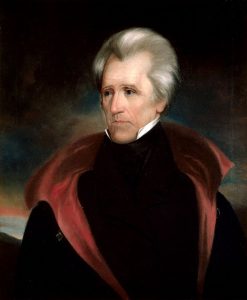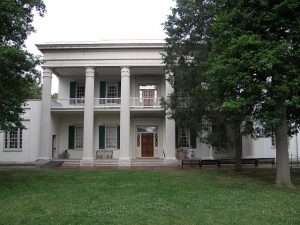Andrew Jackson
Andrew Jackson Biography
Overview

Picture File Source (2)
Andrew Jackson was a highly controversial figure in a American history. As a general he was hero in the War of 1812, where he led a humiliating defeat of the British in New Orleans. But later he took an army to Spanish controlled Florida to subdue the Seminole Indians. During this entry into Florida he attacked some Spanish controlled forts causing an international problem. History has never resolved whether he had orders from President Monroe or not.
Andrew Jackson's The Hermitage Mansion

Quick Facts:
| Full Name | Andrew Jackson |
| Birth Date | March 15, 1767 |
| Birth Place | Waxhaw area, on North Carolina-South Carolina border |
| Death Date | June 8, 1845 |
| Career | Lawyer, Soldier |
| Spouse | August 1791 (2nd ceremony, January 17, 1794), to Rachel Donelson Robards (1767–1828) |
| Children | Andrew Jackson, Jr. (adopted nephew, 1808-1865) |
| President No. | 7 |
| Presidency Begin | March 4, 1829 |
| Presidency End | March 4, 1837 |
| Vice President(s) | John C. Calhoun (1829–1832) Martin Van Buren (1833–1837) |
Andrew Jackson’s actual place of birth is not known however he claims to be from South Carolina. His father died before he was born and his mother and two siblings moved in with uncle James Crawford in Lancaster County, South Carolina.[20]
His older brother, Hugh died in 1779 in the Battle of Stono Ferry. Jackson joined a local militia at age 13 as a courier. Two years later Andrew and his brother Robert were captured by the British. He was slashed with a sword by a British solider while in imprisoned for refusing to polish the soldier’s boots. This left a permanent scar. While being kept prisoner the brothers contracted smallpox, that would kill Robert.
The British released the brothers, but a few days later Robert died from the smallpox. Soon after his brother’s death, his mother died from cholera and Andrew was orphaned. With the deaths of his family and the brutal treatment that he was shown by the British soldiers during the Revolutionary War, Andrew held a lifelong enmity towards the British.
In 1802 Jackson was appointed a major general in the Tennessee militia even though he did not have any military experience. [41]
Jackson would continue his military career in the U.S. military during the War of 1812. He would lead his troops to victory in several battles against the British and the British allied Indians. He would win battles at Fort Mims, Battle of Talladega and the Battle of Horseshoe Bend in March 1814.[44] This victory would allow the United States to grab 20 million acres in present-day Georgia and Alabama. In June, Jackson would be promoted to Major General in the United State Army and command of the Seventh Military Division.[45]
Jackson would continue his success by pursuing British soldiers to New Orleans where Jackson would lead his 5,000 vastly outnumbered soldiers against the British in a thoroughly decisive victory. This would be the last major battle of the War of 1812. Jackson was now a national war hero and his troops would give him the name “Old Hickory”, claiming he was said to be “tough as old hickory wood.”[46]
Resources
Web Sites:
Books:
REFERENCES
- **Presidential Flag Graphic source: Zscout370 at English Wikipedia, CC BY-SA 3.0 <http://creativecommons.org/licenses/by-sa/3.0/>, via Wikimedia Commons
- (1) https://en.wikipedia.org/wiki/James_Monroe
- (20) Remini, Robert V. (1977). Andrew Jackson and the Course of American Empire, 1767–1821. New York, NY: Harper & Row Publishers, Inc. ISBN 978-0-8018-5912-0. p. 5
- (41) Remini 1977, pp. 15–16; 119.
- (44) Wilentz, Sean (2005). Andrew Jackson. New York, NY: Henry Holt and Company. ISBN 978-0-8050-6925-9. pp.25-28
- (45) Remini 1977, p. 222.
- (46) Remini 1977, p. 180.



